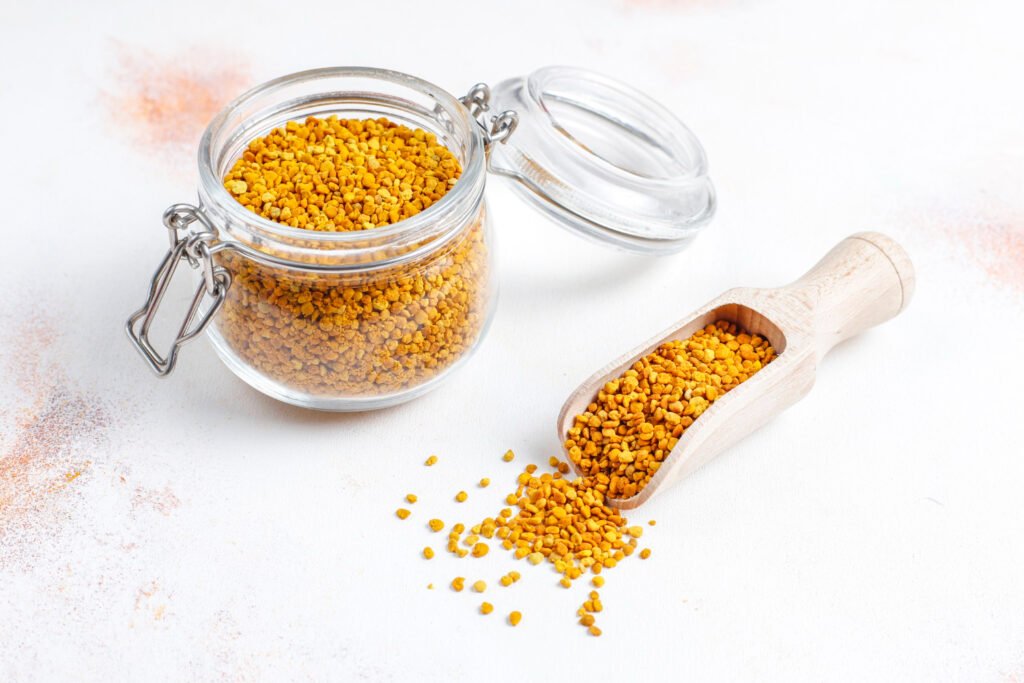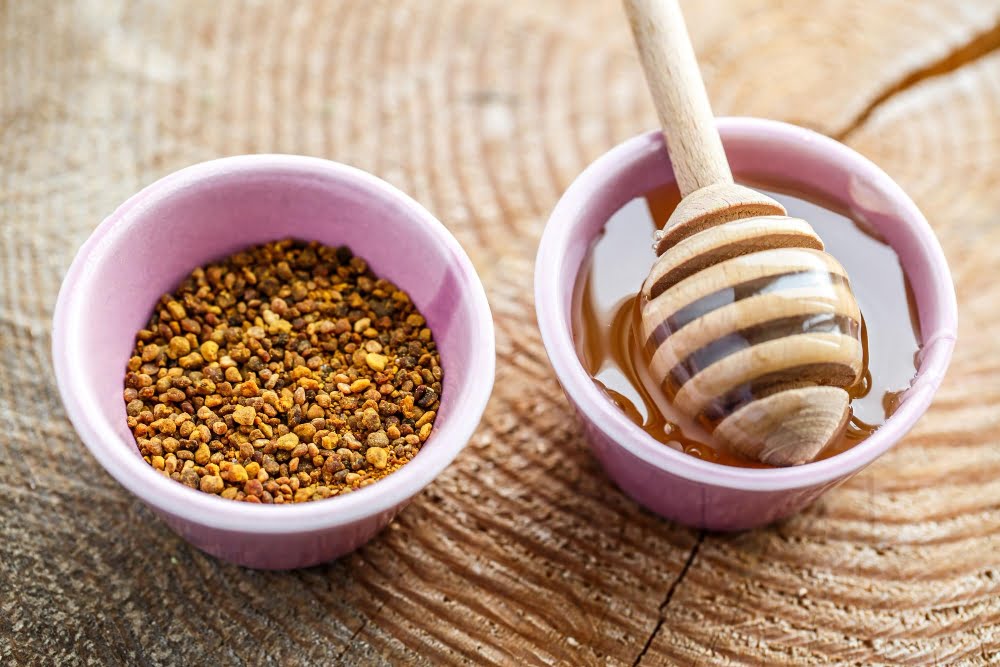FREE SHIPPING OVER $50
Bee Pollen: A Natural Energy and Immune System Booster
In the realm of natural health and wellness, few substances hold the power and nutritional richness of bee pollen. Revered for centuries, bee pollen is far more than just the lifeblood of a bee colony. Its potential benefits extend to humans as well, providing a potent blend of nutrients that can fuel energy levels and fortify the immune system.
In this article, we delve into the captivating world of bee pollen, exploring its remarkable benefits, dosage recommendations, potential side effects, and even its association with skin health and breast growth.
What is Bee Pollen?

Bee pollen is a remarkable natural substance that is created by bees. It’s a mixture of pollen collected from flowers, nectar, and bee saliva. This unique blend is then packed into the hive by bees.
But it’s more than just bee food. Bee pollen is packed with a range of nutrients, including vitamins, minerals, proteins, and amino acids. This nutrient-rich composition has led many to consider it a superfood with potential health benefits.
Some discussions have also revolved around the presence of phytoestrogens in bee pollen. These plant-based compounds have properties similar to human estrogens, sparking interest in their potential impact on breast health.
Bee pollen can be found in various forms, including capsules, making it a convenient option for those looking to harness its potential benefits.
However, it’s important to exercise caution, especially if you have allergies or specific medical conditions. While bee pollen has captured the fascination of health enthusiasts, it’s crucial to approach it with awareness and understanding.
Bee Pollen: A Natural Powerhouse of Nutrients
Bee pollen isn’t just another byproduct of busy bees; it’s a treasure trove of nutrients that has captured the attention of health enthusiasts and researchers alike. This natural wonder is a potent blend of vitamins, minerals, enzymes, proteins, and amino acids, making it a true nutritional powerhouse.
A Natural Multivitamin: Bee pollen isn’t just your regular dietary supplement; it’s a natural multivitamin straight from the heart of nature. Bursting with essential nutrients like B vitamins, antioxidants, and trace minerals, bee pollen can complement your diet with an array of elements crucial for maintaining vitality.
Antioxidant Armor: Antioxidants play a crucial role in combating the harmful effects of free radicals. Bee pollen’s antioxidant content helps protect your cells from oxidative stress, potentially translating to healthier skin and even a boost for your immune system.
Supporting Skin Health: Enthusiasts have long praised bee pollen for its potential benefits for skin health. Some skincare products even include bee pollen as an ingredient. While its precise effects on the skin are still under investigation, the rich nutrient profile of bee pollen suggests it could play a role in promoting skin vitality.
Bee Pollen For Breast Growth: Debunking the Myths and Exploring the Possibilities
Bee pollen, with its rich nutritional composition, has intrigued many, sparking discussions about its potential connection to breast health. While some sources claim that bee pollen can contribute to breast growth, it’s important to delve into the science behind these claims and understand the potential benefits and limitations.
The Role of Phytoestrogens
Bee pollen contains phytoestrogens, compounds found in plants that can mimic the effects of estrogen in the body. Estrogen is a hormone associated with various bodily functions, including breast development. This has led to speculation that the phytoestrogens in bee pollen could potentially influence breast health.
Examining the Claims: Can Bee Pollen Make Your Boobs Grow?
Claims about bee pollen’s ability to enhance breast growth often center around its phytoestrogen content. However, it’s essential to approach these claims with caution. While some individuals may report positive experiences, the effects of phytoestrogens on breast tissue can be complex and vary from person to person.
It’s crucial to recognize that individual responses to bee pollen, particularly about breast health, can differ widely. Factors such as genetics, hormonal balance, and overall health can play a role in how the body interacts with phytoestrogens. What works for one person may not necessarily apply to another.
Before considering bee pollen as a potential aid for breast health, it’s wise to seek guidance from healthcare professionals.
Benefits of Bee Pollen

Bee pollen, often dubbed nature’s superfood, offers an array of potential benefits that make it a standout addition to a healthy lifestyle. Let’s dive into the remarkable advantages that bee pollen brings to the table.
1. Nutrient Powerhouse: Bee pollen is a nutritional powerhouse, containing an impressive array of vitamins, minerals, enzymes, amino acids, and antioxidants. This diverse nutritional profile contributes to its potential to enhance overall well-being.
2. Natural Energy Boost: Bee pollen’s natural composition provides a gentle energy boost, making it a popular choice for those seeking to fuel their activities without relying on stimulants. Its mix of carbohydrates, proteins, and B vitamins can offer sustained energy support.
3. Immune System Support: Rich in antioxidants and bioactive compounds, bee pollen is believed to bolster the immune system. These components work together to help combat oxidative stress and support the body’s natural defense mechanisms.
4. Skin Benefits: While more research is needed, some suggest that bee pollen’s nutrient profile could contribute to skin health. Its antioxidants and potential anti-inflammatory properties may lend a hand in promoting a healthy complexion.
5. Allergy Relief: Contrary to what you might expect, consuming small amounts of bee pollen may actually help alleviate allergies. By introducing your body to trace amounts of local pollen through bee pollen consumption, you might find a natural way to reduce your allergic reactions.
6. Digestive Support: Bee pollen contains enzymes that could assist in breaking down nutrients during digestion. This can potentially enhance nutrient absorption and support gut health.
7. Potential Anti-Inflammatory Properties: Certain compounds found in bee pollen have shown promise in studies related to inflammation reduction. While more research is needed, this suggests that bee pollen could be an interesting avenue for exploring natural anti-inflammatory benefits.
Incorporating bee pollen into your daily routine can be a step toward embracing a more holistic approach to wellness. However, as with any supplement, individual responses may vary.
Side Effects
While bee pollen offers a multitude of potential benefits, it’s essential to be aware that, like any natural substance, it may not suit everyone. Here’s a rundown of possible side effects and considerations when incorporating it into your wellness routine:
1. Allergic Reactions: For those with pollen allergies, consuming bee pollen could lead to adverse reactions. Cross-reactivity between bee pollen and other pollens may trigger allergy symptoms such as itching, swelling, hives, and even anaphylaxis in extreme cases. If you’re prone to pollen allergies, it’s wise to consult a healthcare professional before trying bee pollen.
2. Digestive Distress: Bee pollen is relatively dense in nutrients, and some individuals might experience digestive discomfort, including bloating, gas, or an upset stomach. Starting with a small amount and gradually increasing your intake might help gauge your body’s response.
3. Drug Interactions: Bee pollen could potentially interact with medications or worsen certain conditions. If you’re on medication or have underlying health concerns, it’s advisable to consult your healthcare provider before adding bee pollen to your regimen.
4. High Blood Pressure Concerns: Bee pollen contains naturally occurring substances that might affect blood pressure. If you have hypertension or are taking medications for blood pressure management, it’s crucial to discuss bee pollen consumption with your doctor.
5. Pollen Sensitivity: Bee pollen’s composition includes various types of pollen, which may cause sensitivities in individuals who react to specific plant pollens. If you’re sensitive to pollen, it’s advisable to start with a small amount of bee pollen to gauge your body’s response.
6. Hormonal Interactions: Bee pollen contains phytoestrogens, which are plant compounds that mimic the effects of estrogen in the body. While these compounds may be beneficial for some, individuals with hormonal imbalances or conditions sensitive to estrogen-like effects should exercise caution and consult a healthcare professional.
7. Pregnancy and Breastfeeding: If you’re pregnant or breastfeeding, it’s crucial to consult your healthcare provider before adding bee pollen to your diet. The potential impact on hormonal balance and the developing fetus or nursing infant should be taken into account.
8. Potential Contaminants: Opt for high-quality bee pollen products from reputable sources to minimize the risk of contaminants or allergens. Contaminated bee pollen might lead to adverse reactions or exposure to harmful substances.
As you explore the potential benefits of bee pollen, keep these considerations in mind. While many individuals can enjoy the positive aspects of bee pollen, your health profile plays a significant role in determining your response.
Bee Pollen Dosage: Finding the Right Balance
Discovering the ideal bee pollen dosage is essential for maximizing its benefits while ensuring your well-being. Here’s a short guide to help you navigate bee pollen dosage:
- Start Small: Begin with a small dose, such as 1/4 to 1/2 teaspoon daily, to allow your body to adjust gradually. Pay attention to how your body responds and watch for any discomfort or allergic reactions.
- Gradually Increase: Over time, you can increase the dosage to 1-2 teaspoons per day, but listen to your body’s signals.
- Consult a Professional: If you have health conditions or take medications, consult a healthcare provider before using bee pollen.
- Quality Matters: Choose high-quality bee pollen capsules from reputable sources to ensure purity. With careful consideration, you can incorporate bee pollen into your routine and enjoy its natural benefits.
FAQs
Bee pollen is renowned for its potential to enhance energy levels, support the immune system, and contribute to overall health and vitality.
While bee pollen is generally well-tolerated, some individuals may experience allergic reactions. Symptoms can include itching, swelling, and hives.
Bee pollen contains phytoestrogens, which are believed to have a positive impact on sexual health. However, its effects on sexual health are not well-established and can vary from person to person.
A typical starting dose is around 1/4 to 1/2 teaspoons per day. Then gradually increase the amount while observing any potential reactions.
Yes, it is considered beneficial for the skin due to its rich nutrient content.
Eating bee pollen can offer numerous benefits, including increased energy, immune system support, and potential skin health improvements
Before You Leave
In the dynamic landscape of beauty and well-being, bee pollen shines as a remarkable gem, illuminating the path to natural vitality and immune resilience. As you absorb the enriching benefits of bee pollen, don’t miss the chance to uncover the wonders of Methylene blue, the transformative magic of snail mucin and fulvic acid your very own fountain of youth. Discover the trio that nature offers for a holistic journey toward radiant skin and lasting health. Dive in and explore the fascinating world of these potent allies today!



